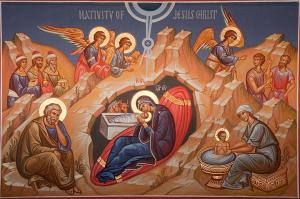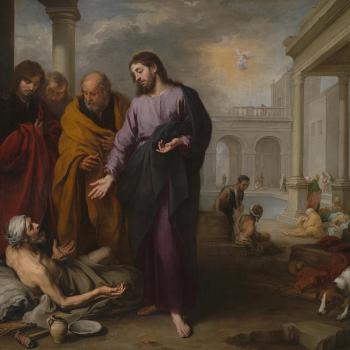
In the beginning – or rather, in eternity before time, if we understand “before” metaphysically and not temporally, was the Word, and the Word was with God, and the Word was God, for the Word was begotten of the Father before all ages. The Word, that is, the Logos, being begotten, and not made, is the only-begotten Son of the Father. Because all things which are made are made through him, and in in, he is himself not anything which has been made.
The Father is eternally the Father of the Son, even as the Son is eternally the Son of the Father; God is born from God, light from light, true God of true God. There is no substantial difference between them: all that God is, is found in the Father, even as it is found in the Son. When we know the Son, we know the Father because of that substantial unity. And yet, the Father is not the Son, nor is the Son the Father. The Father is unbegotten, the Son begotten.
But when the time had fully come, God sent forth his Son, born of woman, born under the law, to redeem those who were under the law, so that we might receive adoption as sons. And because you are sons, God has sent the Spirit of his Son into our hearts, crying, “Abba! Father!” So through God you are no longer a slave but a son, and if a son then an heir (Gal. 4:4-7 RSV).
When the time was right, the Son, the Word, became flesh and was born of a woman, revealing to us the glory of the Father. As Sergius Bulgakov reminds us, the incarnation was planned from the beginning, that is, from when time itself began (or rather, before time itself, in the eternity of God), so that when we talk about the time being right, it was because it was the time which God had determined from his eternity for the incarnation:
According to the direct testimony of Scripture, the coming of Christ into the world, the Incarnation, is predetermined before the creation of the world. That is, it is included in God’s pre-eternal plan for the world, in His counsel concerning the world. Christ is the “lamb without blemish and without spot: who verily was foreordained before the foundation of the world, but was made manifest in these last times for [us]” (I Pet. 1:19-20). [1]
By his birth as man, he reveals to us who he is as a person, as the one who is born: eternally from the Father as God, temporally from Mary, the Mother of God, as man. He is in his one person both God and man. In each of his two births, he is born with the qualities associated with that birth. As God is eternal, so he is eternally born as the only-begotten Son of the Father; as humanity rises in time, and so when the time had come, he, who took on human nature unto himself, was born as man, with all that is naturally associated with humanity being his. His humanity is born in time, it is associated with time, it has a temporal existence, even if in his divinity, he has eternal existence.
Jesus, the God-man, was born as man. Through the incarnation, he gave us the ultimate and final revelation of the divinity to humanity; through his humanity, through his actions as man, we learn of his personal character and quality and come to know him and through him the Father. But his actions do more than merely reveal, he also opens himself up to us, so that we find ourselves called by him, being asked to join with him in his humanity, to be born again in and through him and become adopted children of the Father. We will always be human, but in Christ, we find ourselves taken up as children of God, and as children of God, we receive deifying grace. Deified, we can be called gods in God, gods by grace and not by nature, because we find ourselves participating in the divine life.
We are called to be born with Christ; when we proclaim that Christ is born, we also proclaim our new birth in Christ. We are told that the incarnation unites heaven and earth, that is, the God of heaven has opened up the kingdom of God on earth so that on earth it can be and will be as it is on heaven. Those on the earth are called to the kingdom of God, called to be heirs of the Father, to rise up and call upon the Father through their new birth in Christ. The celebration of the birth of Christ is the celebration of the birth of the kingdom of God on earth, of the eschaton, the eternal reality of the kingdom of God, immanentizing itself in creation. Once heaven has been brought together with earth, then all things can be lifted up in the ascension of Christ, allowing for the realization of the eschaton: through the incarnation, God will be all in all.
St. Gertrude of Helfta understood this in her own mystical way. She experienced her unity with Christ as she experienced being wrapped into Christ in the way Christ was wrapped by his mother after his birth: “And as your blessed mother was preparing to wrap you in the swaddling bands of infancy, I asked to be swaddled with you, so as not to be separated, even by a linen cloth, from him whose embraces and kisses are sweeter by far than a cup of honey.”[2] We, too, should do more than look upon the infant Christ. We too should be embraced by him, and in that embrace, find ourselves wrapped by him; if we do, we will know the comfort and joy which he felt in his humanity when his mother took care of him. We will realize how and why Mary is our spiritual mother. In the birth of Christ, Mary gave birth to the God-man; this meant that she was to become the spiritual mother to all who would unite themselves with him. All that she did with him, she mystically does with everyone who is united with him. She gave birth to him, took care of him in his infancy, raised him up as he grew in wisdom and strength, was by his side throughout his ministry, and stayed with him all the way with his death. Likewise, we can have her with us, by our side, protecting us when we need protection, crying tears of sorrow for us when we suffer, and finding great joy when we find ourselves revived in the Spirit and taking our place as adopted children of God. The story of the nativity is not only a story of the birth of Christ, but the birth of all who will become adopted children of God. When we realize this, we shall find ourselves not only celebrating his birth (which reminds us of his eternal birth from the Father), but also our own spiritual rebirth thanks to our union with Christ.[3] The mystic Hadewijch indicated that she experienced the truth of this one glorious Christmas when she saw the birth of Christ in the souls of the faithful:
It was the entire omnipotence of our Beloved. In it I saw the Lamb (cf. Apoc. 5:6) take possession of our Beloved. In the vast space I saw festivities, such as David playing the harp, and he struck the harp strings. Then I perceived and Infant being born in the souls who live in secret, the souls hidden from their own eyes in the deep abyss of which I speak, and to whom nothing is lacking but that they should lose themselves in it. I saw the forms of many different souls, according what each one’s life had been.[4]
God the Son became flesh, demonstrating to us the truth of Divine Filiation, and through it, the desire of God to share the Divine Life with his creation. The birth of Christ gives us good news because it reveals to us the Trinity. Through the Trinity, we come to realize that God is love. Thus, it should be of no surprise that God the Son in his humanity reflected the image of love, and showed us the way by being the perfect model of charity. In this way, not only do we find ourselves elevated by the incarnation, that is, receiving the deifying grace which is necessary for divine adoption, we find ourselves shown the way of life we will take on, the way of humility and love:
He put on flesh so that he might put on us the strength of the Spirit; he descended from heaven so that he might elevate us from earth to heaven; he paid tribute to Caesar so that he might grant us the grace of perpetual freedom. The Son of God [in the form of] a human being did service to a king who was ignorant of [this] divine servitude, so that in this way [Christ] might also bestow upon us a model of humility, suggesting how greatly we ought to serve each other through charity since he himself did not disdain to commit himself to servitude to one who was unaware of his true character.[5]
God the Word, eternally begotten of the Father, deigned to be born as a lowly child; he emptied himself to become that child, showing us that if we truly want to become adopted children of God, we too must empty ourselves, becoming like Christ, humble servants seeking to work for the good of all, not just because it is the just thing to do (though that would be a good reason), but because it should be, like him, our heart’s desire.
Christ is born! Let us celebrate and rejoice, and be glad in it. Christ is born, glorify him – in his eternal birth from the Father, in his birth from Mary, and in the birth in our souls. Christ is born, glorify him with a life worthy of him!
[1] Sergius Bulgakov, The Lamb of God. Trans. Boris Jakim (Grand Rapids, MI: William B. Eerdmans Publication, 2008), 168.
[2] Gertrude of Helfta, The Herald of Divine Love. Trans. Margaret Winkworth (New York: Paulist Press, 1993), 117.
[3] This does not discount the way we can also see ourselves participating in the birth of Christ: for we know Mary gave birth to Christ, but she also found herself engraced and participating in the new humanity through him. It is the kinds of mystical paradox which we must come to understand if we truly want to know the Christian life, how we can both be born with Christ as well as said to give birth to him in our lives.
[4] Hadewijch, “Visions. Vision 11: The Abyss of Omnipotence” in The Complete Works. Trans. Columba Hart, OSB (New York: Paulist Press, 1980), 289.
[5] St. Bede, Homilies on the Gospels: Volume One. Advent to Lent. Trans. Lawrence T. Martin and David Hurst, OSB (Kalamazoo, MI: Cistercian Publications, 1991), 57 [Homily I.6].
Stay in touch! Like A Little Bit of Nothing on Facebook.
If you liked what you read, please consider sharing it with your friends and family!












